D Train was an American duo that had hits on the Billboard magazine Dance and R&B charts during the first half of the 1980s. Three of their singles also reached the top 30 in the UK Singles Chart.
Madison Park is an American electronica duo composed of husband and wife James and DeAnna Cool.

"Heart of Glass" is a song by the American new wave band Blondie, written by singer Debbie Harry and guitarist Chris Stein. It was featured on the band's third studio album, Parallel Lines (1978), and was released as the album's third single in January 1979 and reached number one on the charts in several countries, including the United States and the United Kingdom.

"Don't Say Your Love Is Killing Me" is a song by English synth-pop duo Erasure, released as the second single from their eighth studio album, Cowboy (1996). It is an uptempo dance music song written by Vince Clarke and Andy Bell. Mute Records issued the single in the UK. For the song's release in the United States, Maverick Records requested a remix for radio. The US single version of "Don't Say Your Love Is Killing Me" is different from what is on the Cowboy album; the song's intro was changed, as well as the middle eight section. An entire verse, edited out of the album version, is restored on the American single release.
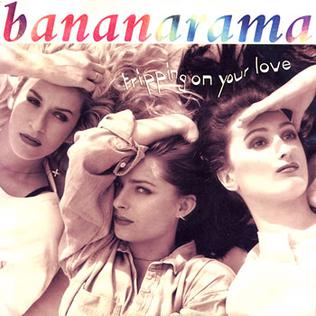
"Tripping on Your Love" is a song recorded by English girl group Bananarama. It appears on the group's fifth studio album, Pop Life (1991), and was released as the album's fourth single in the UK and the first single in the United States. The track was co-written and produced by Youth. This is the last single released featuring member Jacquie O'Sullivan and the group as a trio.

"Cómo Me Duele Perderte" is a song by Cuban American singer Gloria Estefan from her ninth studio, Alma Caribeña (2000). The song was written by Marco Flores with her husband Emilio Estefan and Roberto Blades handling its production. It was released as the album's second single on July 10, 2000, by Epic Records. "Cómo Me Duele Perderte" is a salsa and bachata track that narrates the singer in pain of losing someone. The song was met with unfavorable reactions from two music critics although one reviewer enjoyed the remixes. Commercially, the song topped the Billboard Hot Latin Songs and Tropical Airplay charts in the United States, while also peaking at number 12 on the Dance Club Songs chart in the same country and number eight in Spain. The accompanying music video was directed by Emilio, filmed in Miami, Florida, and features dramatic scenes.

"Heaven's What I Feel" is a 1998 song by Cuban American singer and songwriter Gloria Estefan, released as the lead single from her eighth studio album, gloria! on May 5, 1998 by Epic Records. The song was written by Kike Santander originally for Celine Dion. It was produced by Emilio Estefan, Jr. and Santander. The song is an up-tempo dance-pop, house and dance song.

"Oye" is a song by Cuban American singer and songwriter Gloria Estefan. It was released by Epic on July 13, 1998 as the second single from her eighth studio album, gloria! (1998). The song was written by Estefan, her husband Emilio Estefan, Jr., Randall Barlow and Angie Chirino and produced by Estefan, Jr., Barlow and Tony Moran. It was planned for commercial release in the US on July 14, 1998 in various formats, but at the last minute the release was cancelled. However, the single still reached number one on the US Billboard Hot Dance Music/Club Play chart and in Spain. It earned the Billboard Latin Music Award in the category for "Best Latin Club-Dance Track of the Year".

"Tradición" ("Tradition") is a song by Cuban American singer and songwriter Gloria Estefan. It was released in 1993 as the third single from her first all Spanish-language album, Mi Tierra (1993). The song is heavily influenced by African and Cuban rhythms, and became the first song by Estefan to top the US Billboard Hot Dance Club Play chart, even though it was a Spanish language song. The single was released as a CD single and CD maxi, but some promotional singles were sent to clubs, the main reason why the song went to number-one on that chart for two weeks.

"Nothing Can Stop Us" is a song by English band Saint Etienne, released in May 1991 as the third single from their debut album, Foxbase Alpha (1991). It is the first release to feature Sarah Cracknell, who would continue to front the band from this release on. The single reached the number one spot on the American dance charts for one week. The song is based on a looped sample from Dusty Springfield's recording of "I Can't Wait Until I See My Baby's Face".
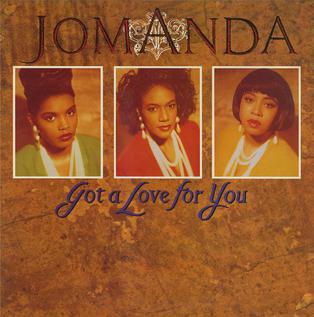
"Got a Love for You" is a song recorded by American vocal trio Jomanda for their debut studio album, Someone to Love Me (1990). It was released as a single in 1991 and hit number one on the US Billboard Dance Club Songs chart for one week. The single also crossed over to the pop charts, becoming their only top 40 hit on the Billboard Hot 100. The single release included remixes from Eric Miller and Steve "Silk" Hurley.
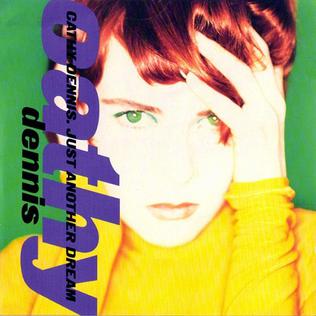
"Just Another Dream" is a song by English singer-songwriter Cathy Dennis, first released in the UK & continental Europe as her solo debut single in 1989. In 1990–1991 it was remixed and included on Dennis' first album, Move to This (1990), and re-released as a single, becoming a top 10 hit in the US. The song was co-written by Dancin' Danny D, a.k.a. D Mob, who also produced the track and sang backing vocals. Poku's vocals are often mistaken for Rick Astley. Two different music videos were produced for the song.
"It Should Have Been Me" is a 1963 song written by William "Mickey" Stevenson and Norman Whitfield for Kim Weston. It has been performed by Yvonne Fair, Gladys Knight & the Pips and Adeva among others. Knight's version peaked at number 40 on the Billboard Hot 100 in 1968. Fair had her only hit single with her recording of the song in 1976, reaching number 5 in the UK, number 85 in the US and number 10 in Australia.

"This Is Your Night" is a song recorded by Dutch singer Amber, released on 21 May 1996 as the lead single from her debut album of the same name (1996). It is written by Amber, and produced by the Berman Brothers and other programmers. In January 1996, a promotional version of this track was released to select Rhythmic Top 40/dance radio stations in New York and Chicago. This version, received minimal airplay before being replaced entirely with the now known "Original Edit," and was never released on any album or single.

"The Love in Your Eyes" is a song by American musician-singer-songwriter Dan Hartman, which was released on November 8, 1994 as the first single from his posthumous album Keep The Fire Burnin'. The song reached No. 53 on Canada's RPM 100 chart in February 1995.

"Take Me Higher" is a song by American singer Diana Ross, released on August 5, 1995, by Motown Records as the first single from her 21st album of the same name (1995). Co-written and produced by Narada Michael Walden featuring additional credits from Mike Mani, it became Ross' fifth number-one on the Billboard Dance Club Songs chart in the US. In Europe, it entered the top forty in Scotland and the UK, but was a even bigger hit on the UK Dance Chart, peaking at number four.
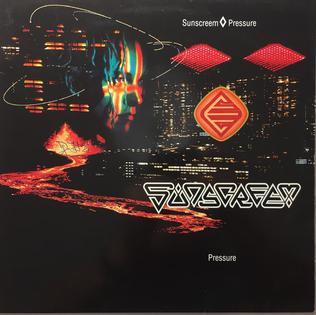
"Pressure" is a song recorded by British techno group Sunscreem, written and produced by band member Paul Carnell and lead singer Lucia Holm for the act's debut album, O3 (1993). Released in 1991, it was the group's first single in the United Kingdom, where it peaked at number 60. It became a major club hit in the United States in wake of the success of "Love U More", where it was released as "Pressure US" with a new remixed version and went to number one on the US Billboard Hot Dance Club Play chart for one week in June 1993, their second of three number ones. The re-released version reentered the UK charts afterwards, peaking at number 19 in 1993.

"Don't Go Breaking My Heart" is a song recorded by Swedish band Sonic Dream Collective, released in 1995 by Remixed Records and Epic as the second single from the band's debut album, Gravity (1995). Becoming a hit in clubs, the song reached number five on the US Billboard Hot Dance Breakouts Club Play Top 5 list in 1997. It is sung by lead vocalist Linn Engström, who also co-wrote the lyrics with Gibril Jobe. The accompanying music video for "Don't Go Breaking My Heart" features the band performing in a club.

"Just Keep Me Moving" is a song by Canadian singer-songwriter k.d. lang, co-written with Ben Mink. It was featured in the 1993 film Even Cowgirls Get the Blues, starring Uma Thurman, as well as the soundtrack album. The single was released in November 1993 by Warner Bros. and Sire, and reached number six on the US Billboard Hot Dance Club Play chart and number seven on the Canadian RPM Adult Contemporary chart. In Europe, it peaked at number 59 on the UK Singles Chart, but was more successful on the UK Dance Singles Chart, peaking at number 35. A music video was also produced to promote the single.
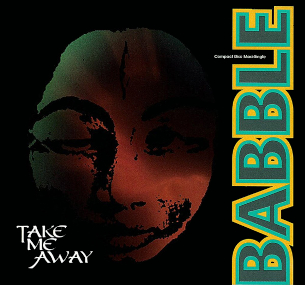
"Take Me Away" is a song from British-New Zealand electronic dance music group Babble, which was released in 1994 as the lead single from their debut studio album The Stone. The song was written and produced by Alannah Currie and Tom Bailey. It reached number 18 on the US Billboard Hot Dance Music Club Play chart.
















